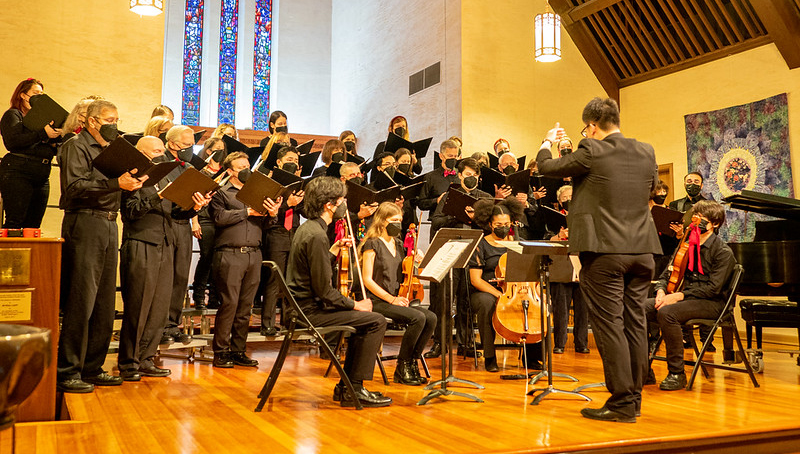By Andrew Hamlin
NORTHWEST ASIAN WEEKLY
Joseph To came all the way from Hong Kong to study and work in the Seattle area. He holds a bachelor’s degree in music education from the University of Washington, plus a master’s degree in choral conducting from Washington State University, and he currently leads several choirs in and around the city.
But according to To, it all started when his mother wanted him to sit down and concentrate.

After awards ceremony with presidents of Washington Chapter of the American Choral Directors Association in July 2022. (Photo provided by Joseph To)
“I started learning piano when I was 5,” he said. “According to my mom, she just wanted to train my patience, at first. (I also hated playing the piano.) I joined the percussion ensemble when I was studying in primary school, school for ages 6-12. I specialized in playing the timpani.
“One day, my teacher asked what we want to be in the future. I answered that I want to wave my arms to make music with people. My teacher taught me conducting, one-on-one.”
To grew up in Lam Tei, part of Hong Kong’s Tuen Mun District. His home had a rural feel in contrast to Hong Kong’s main sections, but light rail and subways made easy connections to Tuen Mun city, and/or Hong Kong’s Central District.
He grew up speaking Hong Kong Cantonese, but learned Mandarin, English, some Japanese, and German as well.
“In Hong Kong, we have to study Cantonese, Mandarin, and English, in public education. I picked up Japanese when I was working as the choir director at [Seattle’s] Japanese Baptist Church. I learned German for a year when I was in college.
“Knowing multiple languages helps me to understand music better. There is text-painting, a music composition technique that often occurs in choral music. Knowing different languages, no doubt, increases my sensitivity.”
He arrived in Seattle in 2017, where he’s lived and worked in several neighborhoods. He notes that Magnolia and Ballard tilt predominately white, whereas Tukwila, where he teaches choir for the school district, feels “like a melting pot, where we have students from around the world.”
Asked about the most difficult struggle of settling in this area, he said, “to find Chinese food that is authentic. When people ask for my recommendation, I always tell them that my kitchen is the most authentic one you will find in Seattle.”
To emphasizes that leading choirs differs from directing an orchestra or a band.
“Choir members are using their bodies to make sounds, and we all have limitations. As a music director, I must understand our body limitations and be compassionate about what my choristers have been through, mentally and physically, in order to sing a piece of music.
“Thus, part of my job is to anticipate their challenges in the music, and proactively generate methods to help them tackle the troubles. No matter how perfect my rehearsal plan is, unexpected things might happen during rehearsals.”

Magnolia Chorale’s “Good Tidings—A Global Celebration” at Magnolia United Church of Christ on Dec. 9, 2022. (Photo provided by Joseph To)
His current choir director gigs include the Norwegian Ladies Chorus of Seattle, the Magnolia Chorale, Prince of Peace Lutheran Church, SeaTac, and the Tukwila School District. He’s also co-chair of the Northwest Girlchoir Racial Equity Committee, plus Community Repertoire and Resources Chair of the Washington Chapter of American Choral Director Association.
One of his pet projects, presenting Mandarin and Cantonese choral music locally, remains a work in progress.
“With the rising interest and accessibility of world choral music, Chinese choral [music] started to be explored by the global choral community. However, due to the difficulty of Chinese diction, choral conductors and educators hesitate to program Chinese choral music for their ensembles.”
His upcoming projects include Magnolia Chorale’s program named “Letter to our Beloved Earth,” a concert dedicated to Earth Day on April 22 and 23. The program features Chinese and Japanese works, both Seattle premieres, by East Asian composers, Ng Cheuk-yin and Kentaro Sato.
Also, he added, the Norwegian Ladies Chorus is “giving a concert in April about scenery in Norway, and we are planning a tour to Norway in 2024.”



